

Down with DOMA: Edith Windsor’s Historic Call with President Obama, Illustrated by Debbie Millman – Brain Pickings. By Maria Popova UPDATE: Now available as a print.

Shortly after the U.S. Supreme Court deemed DOMA unconstitutional June 26, 2013 and made marriage equality a reality, reconstructionist Edith “Edie” Windsor, who had bravely pushed her case through the justice system to the very top and eventually changed the law that had subjected her bereavement to unacceptable injustice, received a phone call from President Barack Obama, delivering the happy, historic news. Obama himself had spoken up against DOMA over the course of Windsor’s years-long case and proclaimed the ruling a “victory for American democracy” after the Supreme Court decision was announced. The Best LGBT Children’s Books: A Sweet and Assuring Celebration of Diversity and Difference – Brain Pickings. “This is the entire essence of life: Who are you?
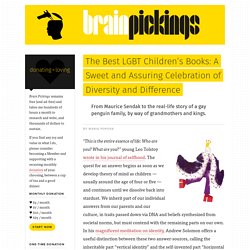
What are you?” Young Leo Tolstoy wrote in his journal of selfhood. The quest for an answer begins as soon as we develop theory of mind as children — usually around the age of four or five — and continues until we dissolve back into stardust. We inherit part of our individual answers from our parents and our culture, in traits passed down via DNA and beliefs synthesized from societal norms, but must contend with the remaining parts on our own. In his magnificent meditation on identity, Andrew Solomon offers a useful distinction between these two answer-sources, calling the inheritable part “vertical identity” and the self-invented part “horizontal identity.” Gathered here is a selection of intelligent, imaginative, and deeply assuring children’s books for little humans anxious or anguished by their particular point of difference — loving or identifying with a gender other than the one society has prescribed for them to love or be.
Presence, Not Praise: How To Cultivate a Healthy Relationship with Achievement – Brain Pickings. By Maria Popova Despite ample evidence and countless testaments to the opposite, there persists a toxic cultural mythology that creative and intellectual excellence comes from a passive gift bestowed upon the fortunate few by the gods of genius, rather than being the product of the active application and consistent cultivation of skill.
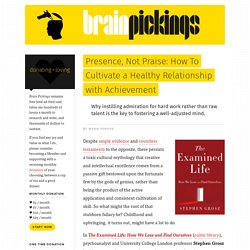
So what might the root of that stubborn fallacy be? Childhood and upbringing, it turns out, might have a lot to do. In The Examined Life: How We Lose and Find Ourselves (public library), psychoanalyst and University College London professor Stephen Grosz builds on more than 50,000 hours of conversation from his quarter-century experience as a practicing psychoanalyst to explore the machinery of our inner life, with insights that are invariably profound and often provocative — for instance, a section titled “How praise can cause a loss of confidence,” in which Grosz writes: Nowadays, we lavish praise on our children.
Public domain images via Flickr Commons. The Agony of the Artist (with a capital A): E.E. Cummings on What It Really Means to Be an Artist and His Little-Known Line Drawings – Brain Pickings. “You’re an artist when you say you are,” Amanda Palmer offered in her emboldening reflection on the creative life.
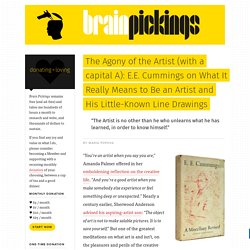
“And you’re a good artist when you make somebody else experience or feel something deep or unexpected.” Nearly a century earlier, Sherwood Anderson advised his aspiring-artist son: “The object of art is not to make salable pictures. It is to save yourself.” An Illustrated Celebration of the Little-Known Mothers, Brothers, Friends, Wives, and Other Unsung Champions Behind Geniuses – Brain Pickings. There is something quite wonderful about witnessing one human being selflessly bolster the creative achievement of another, especially in a culture where it’s easier to be a critic than a celebrator — from the man who helped Bukowski quit his soul-sucking day job to become a full-time writer to the way Ursula Nordstrom nurtured young Maurice Sendak’s talent.
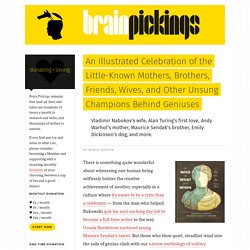
But those who blow quiet, steadfast wind into the sails of genius clash with our narrow mythology of solitary brilliance — not to mention that as we so readily dismiss creative contribution on the accusatory grounds of “privilege” today, we weigh the material advantages but forget that the loving and staunch support of human capital is often the greatest privilege of all. And for many people we’ve come to celebrate as geniuses, such human capital was precisely what made their achievements possible — a vital aid rather than a detractor of their greatness.
Rothman and team write in the introduction: Acampora writes: Niekrasz writes: How To Be a Nonconformist: 22 Irreverent Illustrated Steps to Counterculture Cred from 1968 – Brain Pickings. By Maria Popova “Why do you have to be a nonconformist like everybody else?
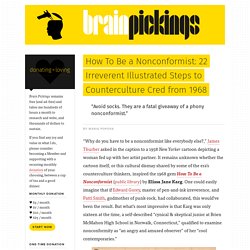
,” James Thurber asked in the caption to a 1958 New Yorker cartoon depicting a woman fed up with her artist partner. How to Find Fulfilling Work. “If one wanted to crush and destroy a man entirely, to mete out to him the most terrible punishment,” wrote Dostoevsky, “all one would have to do would be to make him do work that was completely and utterly devoid of usefulness and meaning.”
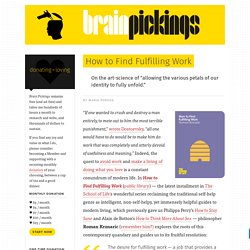
Indeed, the quest to avoid work and make a living of doing what you love is a constant conundrum of modern life. In How to Find Fulfilling Work (public library) — the latest installment in The School of Life’s wonderful series reclaiming the traditional self-help genre as intelligent, non-self-helpy, yet immensely helpful guides to modern living, which previously gave us Philippa Perry’s How to Stay Sane and Alain de Botton’s How to Think More About Sex — philosopher Roman Krznaric (remember him?) Explores the roots of this contemporary quandary and guides us to its fruitful resolution: Never have so many people felt so unfulfilled in their career roles, and been so unsure what to do about it. The Art of Thought: Graham Wallas on the Four Stages of Creativity, 1926 – Brain Pickings. By Maria Popova In 1926, thirteen years before James Webb Young’s Technique for Producing Ideas and more than three decades before Arthur Koestler’s seminal “bisociation” theory of how creativity works, English social psychologist and London School of Economics co-founder Graham Wallas, sixty-eight at the time, penned The Art of Thought — an insightful theory outlining the four stages of the creative process, based both on his own empirical observations and on the accounts of famous inventors and polymaths.
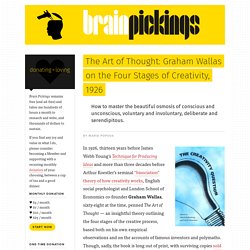
Though, sadly, the book is long out of print, with surviving copies sold for a fortune and available in a few public libraries, the gist of Wallas’s model has been preserved in a chapter of the 1976 treasure The Creativity Question (public library) — an invaluable selection of meditations on and approaches to creativity by some of history’s greatest minds, compiled by psychiatrist Albert Rothenberg and philosopher Carl R. T. S. Public domain images via Flickr Commons. How to Hone Your Creative Routine and Master the Pace of Productivity. By Maria Popova We seem to have a strange but all too human cultural fixation on the daily routines and daily rituals of famous creators, from Vonnegut to Burroughs to Darwin — as if a glimpse of their day-to-day would somehow magically infuse ours with equal potency, or replicating it would allow us to replicate their genius in turn.
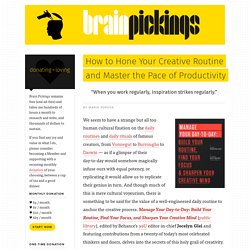
And though much of this is mere cultural voyeurism, there is something to be said for the value of a well-engineered daily routine to anchor the creative process. Manage Your Day-to-Day: Build Your Routine, Find Your Focus, and Sharpen Your Creative Mind (public library), edited by Behance’s 99U editor-in-chief Jocelyn Glei and featuring contributions from a twenty of today’s most celebrated thinkers and doers, delves into the secrets of this holy grail of creativity. It’s time to stop blaming our surroundings and start taking responsibility. While no workplace is perfect, it turns out that our gravest challenges are a lot more primal and personal.
Synesthesia and the Poetry of Numbers: Autistic Savant Daniel Tammet on Literature, Math, and Empathy, by Way of Borges – Brain Pickings. By Maria Popova Daniel Tammet was born with an unusual mind — he was diagnosed with high-functioning autistic savant syndrome, which meant his brain’s uniquely wired circuits made possible such extraordinary feats of computation and memory as learning Icelandic in a single week and reciting the number pi up to the 22,514th digit.
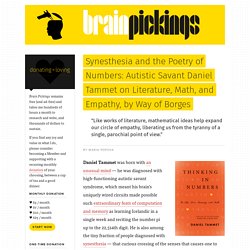
He is also among the tiny fraction of people diagnosed with synesthesia — that curious crossing of the senses that causes one to “hear” colors, “smell” sounds, or perceive words and numbers in different hues, shapes, and textures. Synesthesia is incredibly rare — Vladimir Nabokov was among its few famous sufferers — which makes it overwhelmingly hard for the majority of us to imagine precisely what it’s like to experience the world through this sensory lens.
Imagine. Close your eyes and imagine a space without limits, or the infinitesimal events that can stir up a country’s revolution. “Tip-of-the-Tongue Syndrome,” Transactive Memory, and How the Internet Is Making Us Smarter – Brain Pickings. By Maria Popova “The dangerous time when mechanical voices, radios, telephones, take the place of human intimacies, and the concept of being in touch with millions brings a greater and greater poverty in intimacy and human vision,” Anaïs Nin wrote in her diary in 1946, decades before the internet as we know it even existed. Her fear has since been echoed again and again with every incremental advance in technology, often with simplistic arguments about the attrition of attention in the age of digital distraction. But in Smarter Than You Think: How Technology is Changing Our Minds for the Better (public library), Clive Thompson — one of the finest technology writers I know, with regular bylines for Wired and The New York Times — makes a powerful and rigorously thought out counterpoint.
He writes in the introduction: These tools can make even the amateurs among us radically smarter than we’d be on our own, assuming (and this is a big assumption) we understand how they work. Nobel Peace Prize Winner Jody Williams on How Our Choices Shape the World, Animated – Brain Pickings. By Maria Popova “It is not necessary to accept the choices handed down to you by life as you know it,” young Hunter S. Thompson wrote in his exquisite letter of advice to a friend.
In fact, life — the world — only ever changes when we actively refuse to accept its givens and choose to build new alternatives. But what separates those who unblinkingly accept the world as it is, with all its injustices and imperfections, from those who tirelessly labor to make it better, in the most actionable, least pageant-like sense of the aspiration?
That’s what human rights activist Jody Williams, recipient of the 1997 Nobel Peace Prize and author of the infinitely inspiring My Name Is Jody Williams: A Vermont Girl’s Winding Path to the Nobel Peace Prize (public library), explores in this wonderful animated short from the RSA: What has fueled my passion for change really is righteous indignation at injustice. What is an activist? Debunking the Myth of the 10,000-Hours Rule: What It Actually Takes to Reach Genius-Level Excellence. By Maria Popova The question of what it takes to excel — to reach genius-level acumen at a chosen endeavor — has occupied psychologists for decades and philosophers for centuries. Groundbreaking research has pointed to “grit” as a better predictor of success than IQ, while psychologists have admonished against the dangers of slipping into autopilot in the quest for skill improvement.
In recent years, one of the most persistent pop-psychology claims has been the myth of the “10,000-hour rule” — the idea that this is the amount of time one must invest in practice in order to reach meaningful success in any field. But in Focus: The Hidden Driver of Excellence (public library), celebrated psychologist and journalist Daniel Goleman, best-known for his influential 1995 book Emotional Intelligence, debunks the 10,000-hour mythology to reveal the more complex truth beneath the popular rule of thumb: Hours and hours of practice are necessary for great performance, but not sufficient. The Value of Not Understanding Everything: Grace Paley’s Advice to Aspiring Writers. By Maria Popova “As a person she is tolerant and easygoing, as a user of words, merciless,” the editors of The Paris Review wrote in the introduction to their 1992 interview with poet, short story writer, educator, and activist Grace Paley (December 11, 1922–August 22, 2007).
Although Paley herself never graduated from college, she went on to become one of the most beloved and influential teachers of writing — both formally, through her professorships at Sarah Lawrence, Columbia, Syracuse University, and City College of New York, and informally, through her insightful lectures, interviews, essays, and reviews. The best of those are collected in Just As I Thought (public library) — a magnificent anthology of Paley’s nonfiction, which cumulatively presents a sort of oblique autobiography of the celebrated writer.
Therein, she argues, lies the key to why writers write. I would suggest something different… what are some of the things you don’t understand at all? Poet Jane Kenyon’s Advice on Writing: Some of the Wisest Words to Create and Live By. By Maria Popova In Still Writing: The Pleasures and Perils of a Creative Life — one of the finest, most insightful reflections on the creative experience ever committed to words — writer Dani Shapiro mentions a set of instructions by the poet Jane Kenyon (May 23, 1947–April 22, 1995), a writing mantra of sorts, which she keeps tacked above her desk. Literature being the original internet, I followed this analog hyperlink to Kenyon’s A Hundred White Daffodils: Essays, Interviews, The Akhmatova Translations, Newspaper Columns, and One Poem (public library) — an altogether marvelous posthumous collection. These uncommonly sage instructions appear in a piece titled Everything I Know About Writing Poetry — Kenyon’s notes for a lecture she delivered at a literary conference in 1991, a superb addition to this growing compendium of writers’ advice on the craft.
Willa Cather on Writing Through Troubled Times: A Moving Letter to Her Younger Brother – Brain Pickings. By Maria Popova How does one keep going when the going gets really, really tough? From The Selected Letters of Willa Cather (public library) — which also gave us Cather’s only surviving letter to her partner, the editor Edith Lewis — comes a magnificent letter 43-year-old Cather wrote to her younger brother on July 8, 1916. Ray Bradbury on Failure, Why We Hate Work, and the Importance of Love in Creative Endeavors – Brain Pickings. By Maria Popova “A master in the art of living draws no sharp distinction between his work and his play,” the French writer Chateaubriand is credited with saying. “He simply pursues his vision of excellence through whatever he is doing, and leaves others to determine whether he is working or playing. To himself, he always appears to be doing both.” Schopenhauer on Style. By Maria Popova What does it mean to write with style? For Kurt Vonnegut, it was about keeping it simple yet interesting.
Flannery O’Connor on Why the Grotesque Appeals to Us, Plus a Rare Recording of Her Reading “A Good Man Is Hard to Find” – Brain Pickings. By Maria Popova Flannery O’Connor (March 25, 1925–August 3, 1964) is among the titans of twentieth-century literature (in addition to being a lesser-known satirical cartoonist). In 1960, O’Connor penned an essay titled “Some Aspects of the Grotesque in Southern Fiction,” eventually included in the altogether fantastic posthumous collection of her unpublished lectures, essays, and critical articles, Mystery and Manners: Occasional Prose (public library). The Workhorse and the Butterfly: Ann Patchett on Writing and Why Self-Forgiveness Is the Most Important Ingredient of Great Art.
By Maria Popova. Leonard Cohen on Creativity, Hard Work, and Why You Should Never Quit Before You Know What It Is You’re Quitting – Brain Pickings. Make Good Art: Neil Gaiman’s Advice on the Creative Life, Adapted by Design Legend Chip Kidd – Brain Pickings. Among the greatest commencement addresses of all time is an extraordinary speech beloved author Neil Gaiman delivered in May of 2012 at Philadelphia’s University of the Arts. Leo Buscaglia on Education, Industrialized Conformity, and How Stereotypes and Labels Limit Love. By Maria Popova. What Books Do for the Human Soul: The Four Psychological Functions of Great Literature – Brain Pickings. By Maria Popova The question of what reading does for the human soul is an eternal one and its answer largely ineffable, but this hasn’t stopped minds big and small from tussling with it — we have Kafka’s exquisite letter to his childhood friend, Maurice Sendak’s visual manifestos for the joy of reading, and even my own answer to a nine-year-old girl’s question about why we have books today.
The Hand Through the Fence: Pablo Neruda on What a Childhood Encounter Taught Him About Writing and Why We Make Art – Brain Pickings. By Maria Popova. How to Let Your Life Speak, Discern Your Purpose, and Define Your Own Success – Brain Pickings. Margaret Mead and James Baldwin on Identity, Race, the Immigrant Experience, and Why the “Melting Pot” Is a Problematic Metaphor – Brain Pickings. Presence, Not Praise: How To Cultivate a Healthy Relationship with Achievement – Brain Pickings. Leisure, the Basis of Culture: An Obscure German Philosopher’s Timely 1948 Manifesto for Reclaiming Our Human Dignity in a Culture of Workaholism – Brain Pickings.
Mary Oliver on What Attention Really Means and Her Moving Elegy for Her Soul Mate. How to Love: Legendary Zen Buddhist Teacher Thich Nhat Hanh on Mastering the Art of “Interbeing” – Brain Pickings. A Rap on Race: Margaret Mead and James Baldwin’s Rare Conversation on Forgiveness and the Difference Between Guilt and Responsibility – Brain Pickings. Anaïs Nin on Love, Hand-Lettered by Debbie Millman. Bertrand Russell on Immortality, Why Religion Exists, and What “The Good Life” Really Means – Brain Pickings. The Future Belongs to the Curious: A Manifesto for Curiosity. The Science of Stress and How Our Emotions Affect Our Susceptibility to Burnout and Disease – Brain Pickings. The Agony of the Artist (with a capital A): E.E. Cummings on What It Really Means to Be an Artist and His Little-Known Line Drawings – Brain Pickings. Sir Ken Robinson on How Finding Your Element Changes Everything – Brain Pickings. Five Manifestos for the Creative Life – Brain Pickings.
Susan Sontag on Love: Illustrated Diary Excerpts – Brain Pickings. Anaïs Nin on Real Love, Illustrated by Debbie Millman – Brain Pickings. Albert Camus on Happiness and Love, Illustrated by Wendy MacNaughton – Brain Pickings. The Silent Music of the Mind: Remembering Oliver Sacks – Brain Pickings. Susan Sontag on Art: Illustrated Diary Excerpts – Brain Pickings. The Best Brain Pickings Articles of 2014 – Brain Pickings. The Ego and the Universe: Alan Watts on Becoming Who You Really Are – Brain Pickings. The Secret to Learning Anything: Albert Einstein’s Advice to His Son. French Polymath Henri Poincaré on How Creativity Works – Brain Pickings. A 5-Step Technique for Producing Ideas circa 1939 – Brain Pickings. The Daily Routines of Great Writers – Brain Pickings. The Science of Productivity, Animated – Brain Pickings.
Daily Rituals: A Guided Tour of Writers’ and Artists’ Creative Habits – Brain Pickings.